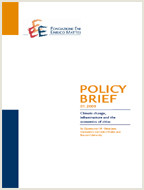Sustainability: the road not (yet) taken beyond GDP?
The gross domestic product (GDP) is probably the best known and widespread measure of the wealth of nations. It is a simple and straightforward measure, easy to understand and to compare across countries, even when they differ dramatically in their economic development. The appealing nature of GDP – expressed as a single and simple number – hides limitations, which have been recently exposed by a new strand of literature identified as “beyond GDP”. Going beyond GDP implies shifting the focus from a purely economic perspective to a more holistic one, able to incorporate information relevant to social progress and to provide a dynamic and sustainable measure of development. Besides working to define a more effective version of GDP, the path “beyond GDP” offers many insights into the definition of other indicators and indices, but the road to substituting GDP with alternative indicators is “long and winding”. This Policy Brief addresses the theoretical and practical implications of walking down the “beyond GDP” path. After discussing the theoretical limitations of GDP, we detail why GDP alone is not able to inform policy-making and assist it in achieving a sustainable development. Then, we discuss recent examples of more complex indicators that try to do so. We review the theoretical and methodological issues that challenge the credibility and applicability of more complex measures such as sustainability indices. In particular, we focus on the FEEM Sustainability Index (FEEM SI), whose ability to work as a simulation environment demonstrates the potential of more sophisticated indices in supporting policy makers to understand the complex relations across the different components of sustainability and devise better and more effective policies.

